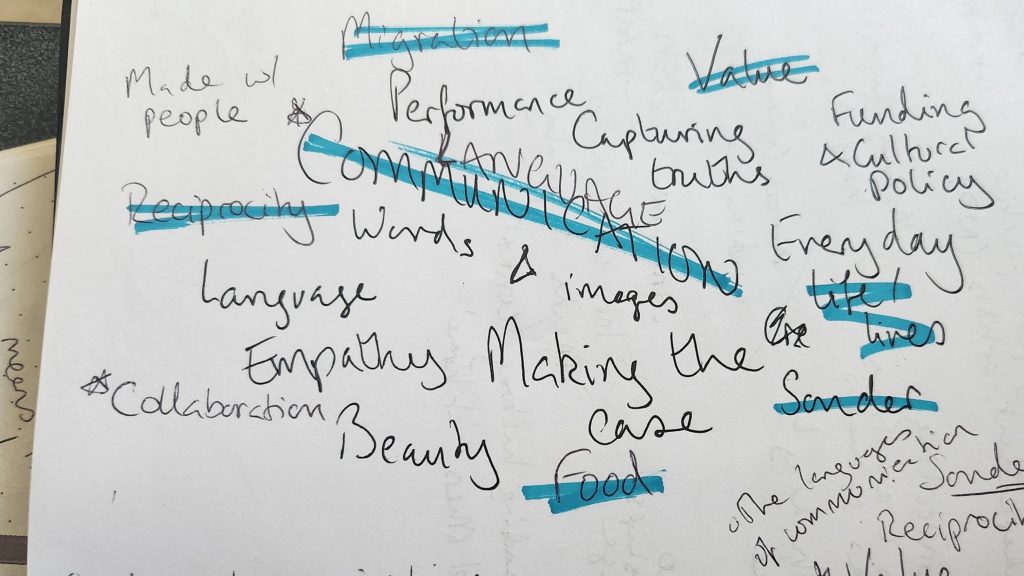This week I’m returning to thinking about my practice based around these new prompts:
- Reflect on what ‘practice’ and ‘practising’ mean to you. Ask yourself: How do I know when I’m practicing/practising? (working, labouring, etc.). What differentiates my cultural production from other parts of my life?
- Identify three to five processes that organise how you work. Discuss what these are, why they’re important and what you’ve been able to accomplish thanks to prioritising them.
Viewed through an intercultural lens, I have both a professional and a personal practice. So the question of how I know when I’m practicing is a difficult one. I’m spending a lot of time at the moment learning Spanish, which feels like part of my intercultural practice, my efforts to become an active participant in a culture that’s new to me. But are day-to-day conversations with my partner practising just because I’m speaking in Spanish? Maybe not when it’s about groceries, but when we’re discussing a topic, navigating the different views we have, which are informed by our cultural backgrounds, perhaps then I could describe myself as practicing. In these moments, I do feel like I’m generating knowledge and ways of thinking.
Similarly, within my professional work, some of what I do does not feel especially intercultural. And recently some of it isn’t within cultural production, for example, I’ve started providing access support (generally editing) to a neurodiverse therapist. But there are connections with my practice within cultural production, through the skills I’m using and developing, especially as I regularly provide access support to neurodiverse artists.
The processes of my practice:
- Working to make art happen (fundraising, administration); and to bring audiences to that art.
- Understanding the systems at play and working within them (funding; artistic production; mass communications).
- Thinking critically about an artistic project’s place in the world, its value, its offer and finding ways to articulate this to different people, for different purposes.
- Parsing information and relaying it for a distinct audience, including across cultural boundaries, generally in words and images – trying to understand how these come across to different/particular people.
- Looking for and telling stories – always based on the lived experience of myself or others.
- In my personal life at the moment, learning about another culture (including language, history, food, art) in order to become an active participant of that culture, forming relationships with people and sharing what I’ve learnt with others.
How I make value:
- Literally generating money for projects.
- Identifying information and stories that should be shared, and sharing them in an effective way that brings about change or action in others.
- Through a study of value itself – measuring, analysing, evaluating, articulating and evidencing the impact and value of artistic work.
- Questioning and challenging systems to bring about change.
What’s my question/problem?
- How can art & culture help us understand each other better? Live together better?
- How do we create and support a cultural ecosystem that is accessible and beneficial to all, and representative of all?
- How do you communicate – information, ideas, emotions – to someone who you don’t know? Someone who sees the world differently?
Dividing my practice in this way, I can see some more through-lines. Both editorial direction and marketing are about understanding discourses, cultural movements and perspectives, and working within or challenging these.
One observation I’ve made is that I’m always working with the stuff of life – I don’t generate fictions and the artistic projects I’ve been involved in aren’t concerned with fictions either. This is a through-line from my journalism to my work with Quarantine, a company that makes art with regular people and involves them telling their stories or creating a frame in which something new can occur – life as art/art as life.
Outside of personal projects, which I’ve nearly always kept private, my practice is collaborative. My role on projects tends to be supportive, responding to a need or some exterior force, and so I don’t think the work I’ve done is necessarily a direct representation of my internal motivations or interests. Although inevitably this work is generative and my interests reflect where I’ve spent time and effort in my life.

Leave a Reply